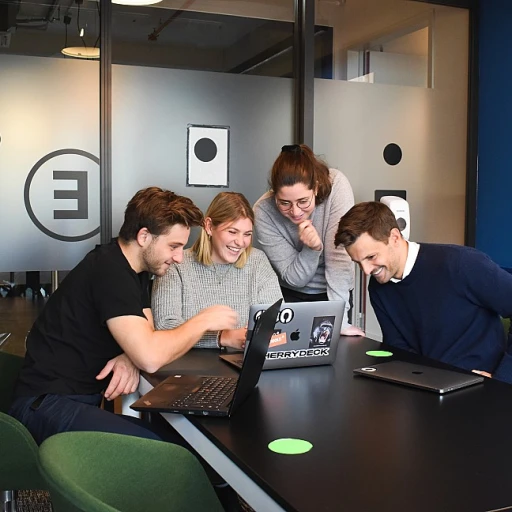
Understanding the Role of Talent Coordinators
The Strategic Role of Talent Coordinators in Influencer Agencies
In the dynamic environment of influencer marketing, talent coordinators play a pivotal role. As the backbone of these agencies, they serve as the primary connection between brands and creators, ensuring seamless collaborations and fostering long-term relationships. It's their responsibility to align the goals of brands with the unique content and reach of influencers, which requires a keen understanding of both digital marketing trends and human relationships.
Talent coordinators are tasked with managing the intricate web of brand partnerships and influencer talent. This involves meticulously vetting influencers to ensure alignment with brand values, managing contracts, and negotiating terms that benefit both parties. The role also demands a grasp of platforms like Instagram, TikTok, and YouTube, where influencers operate predominantly.
Being adept at analyzing data is crucial for talent coordinators. Web and social media analytics help in identifying top influencers and assessing the impact of campaigns, facilitating decisions that maximize the return on investment for all involved. In bustling markets like Los Angeles, where influencer agencies are at the forefront, talent coordinators often have to tackle these tasks in a fast-paced, competitive environment.
While working remotely has become the norm, talent coordinators must manage teams and collaborate effectively across time zones and digital platforms. This ability ensures that influencer agencies remain agile and effective amidst shifting marketing landscapes and consumer behaviors.
As the role evolves with the integration of advanced technologies, the challenges faced by talent coordinators demand innovative solutions. Whether through better management systems or enhanced data analytical tools, maintaining efficiency and efficacy is crucial for success. In doing so, they pave the way for effective talent management, bridging the gap between brands and social media stars.
To gain greater insights into how digital tools assist with maintaining records and optimizing workflows, consider exploring the mechanisms digital systems provide in the realm of digital records of candidates.
Challenges Faced by Talent Coordinators
Challenges Talent Coordinators Face
The dynamic nature of influencer marketing presents unique challenges for talent coordinators in agencies. These professionals are the linchpin connecting brands with the right creators, making their role both crucial and multifaceted. Understanding the complexities involved can better prepare coordinators to navigate these obstacles effectively.
Firstly, balancing the demands of multiple stakeholders is a significant challenge. Coordinators often mediate between influencers, brands, and internal teams, requiring exceptional management skills to align objectives and timelines. This involves juggling various expectations, from content delivery to brand partnerships, ensuring all parties are satisfied.
Data management is another substantial hurdle. Coordinators must track extensive data regarding influencer performance metrics, content engagement rates, and campaign outcomes. Managing this data efficiently is vital for informing strategic decisions and maintaining effective talent management. As a practical solution, agencies often turn to advanced technological solutions to streamline data processes.
- Remote Work Dynamics: The rise of remote work amid global shifts poses additional challenges. Coordinators must foster effective communication and collaboration among remote teams to ensure cohesive brand representation across diverse social media platforms.
- Adapting to Platform Changes: Social media platforms constantly evolve, affecting influencer reach and engagement. Coordinators must stay abreast of these changes and adjust strategies accordingly to maintain competitiveness and alignment with current digital marketing trends.
Given these challenges, talent coordinators also face pressure to deliver consistent results in a fast-paced environment. Their adaptability and problem-solving skills are put to the test daily. Finding solutions such as effective talent acquisition strategies helps in overcoming these hurdles and achieving long-term success in influencer talent management.
To explore more about how talent coordinators in influencer agencies can navigate employment challenges and opportunities, you can visit a detailed resource here.
Integrating Human Resources Information Systems
Streamlining Operations with HRIS
In the dynamic world of influencer marketing, talent coordinators play a pivotal role in managing relationships between creators and brands. However, the complexity of this role often presents challenges, particularly in handling vast amounts of data and coordinating across multiple platforms. This is where Human Resources Information Systems (HRIS) come into play, offering a robust solution to streamline operations and enhance efficiency.
HRIS can significantly improve the workflow of talent coordinators by automating routine tasks and providing a centralized platform for data management. This integration allows coordinators to focus more on strategic aspects of talent management, such as building long-term brand partnerships and enhancing the overall effectiveness of talent acquisition strategies.
Benefits of HRIS in Influencer Agencies
- Centralized Data Management: HRIS provides a single source of truth for all talent-related data, making it easier for coordinators to access and manage information efficiently.
- Improved Communication: With integrated communication tools, HRIS facilitates seamless interaction between talent coordinators, influencers, and brands, ensuring everyone is on the same page.
- Enhanced Reporting: The system offers advanced reporting capabilities, allowing coordinators to track performance metrics and make data-driven decisions.
- Remote Work Capabilities: As influencer agencies often operate across different geographies, HRIS supports remote work by providing cloud-based access to essential tools and data.
By leveraging HRIS, influencer agencies can not only optimize their talent coordination processes but also enhance their overall talent management strategies. For more insights on how technology can enhance efficiency in talent management, explore enhancing efficiency with crew self-service systems.













